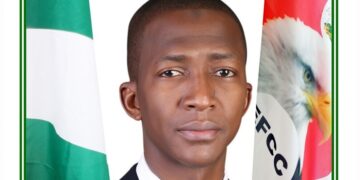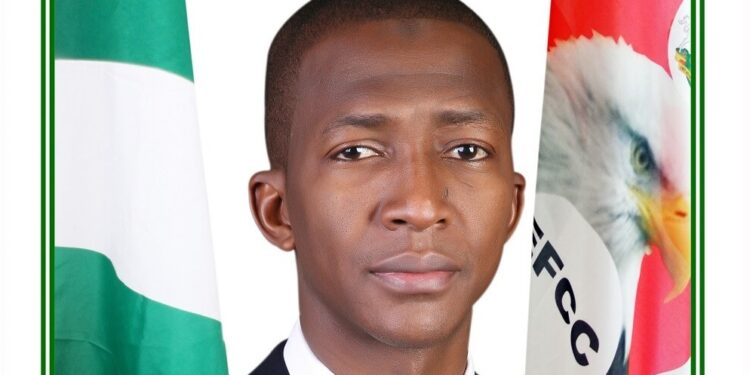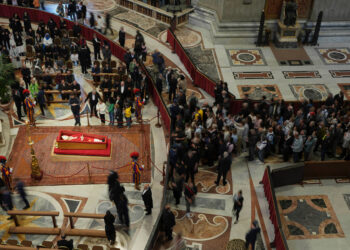By Olusegun Adeniyi
Last Sunday, ‘Premium Times’ reported that President Bola Tinubu had decided to appoint Olanipekun Olukoyede as the substantive chairperson of the Economic and Financial Crimes Commission (EFCC). A legal practitioner, Olukoyede served as secretary of the commission for two years before he was suspended along with Ibrahim Magu (then acting chair) and a few other officials in 2020. The concern raised by the online newspaper about the choice of Olukayode is anchored on Section 2(3) of the EFCC Act, 2005 which stipulates that the commission chairman “must be a serving or retired member of any government security or law enforcement agency not below the rank of Assistant Commissioner of Police or equivalent; possess not less than 15 years’ experience.” According to the report, Olukoyede, “who has primarily played administrative roles in EFCC for less than a decade, cannot be said to have attained 15 years of cognate experience, especially when he has never worked in the mainstream law enforcement operations of the commission or any related agency.”
Beyond the issue of qualification raised by ‘Premium Times’, I have two additional concerns about the appointment. One, at a time the Independent Corrupt Practices Commission (ICPC) is chaired by Professor Bolaji Owasanoye, appointing another Yoruba man to head EFCC would be the height of recklessness. In case the president is not aware (a Villa disease, especially under his predecessor), most Yoruba people I know are becoming increasingly embarrassed by a number of his appointments. I have received many of those WhatsApp messages that list critical offices in the economic/financial sector and the ethnic affiliation of appointees. There is already a whispering campaign in Abuja of a budding ‘Republic of Oduduwa’, based on these appointments. I hope someone will bring the issue to the attention of the president.
Interestingly, barely three weeks after the current administration’s inauguration, on 20th June to be specific, I wrote ‘Tinubu and the Buhari Error’ where I warned the president not to play ‘Amunibuni’ with a rehash of similar counsel his predecessor failed to heed. “Of the several columns I wrote on the lack of sensitivity in critical appointments by President Muhammadu Buhari, one stands out. I used a Yoruba word, ‘Amunibuni’, to situate my intervention,” I recalled in the piece with excerpts from the March 2021 column: “That making strategic concessions is beyond Buhari administration is an embarrassment, even for many northerners. That is because they are also aware that the appointments being cornered by a tiny clique is not to promote any ‘Northern agenda’ (whatever that may mean) but rather in pursuit of the personal interest by those who nominate these individuals. This explains why they go for their in-laws, kinsmen, friends, and the like. Yet nepotism in critical appointments engenders collective insults in the manner of ‘Abunibuni’”.
I went ahead to do a disquisition on what the Yoruba term means and the message it embeds within the context of Nigeria’s political arrangement before I concluded with an admonition for Tinubu three months ago: “Even when he did nothing to improve the material condition of the average Fulani man, the damage President Buhari did to people of that ethnic stock in eight years was enormous. And as a Yoruba man, I wouldn’t want President Tinubu to do that to me. I am aware that there are thousands of appointments still to make and most of these things ultimately even out. But signalling is also important, especially by a new administration. That is why presidential handlers need to be circumspect lest they attract insults to Yoruba people who have always advocated for a peaceful and secure Nigeria that works for all citizens and where there is equity and justice in the distribution of opportunities…In making critical appointments, I hope the president will be mindful of the ‘Amunibuni’ syndrome. His appointments must be inclusive and reflect all our diversities. I shall be watching!”
Whatever may be his qualifications, it should be obvious that in a diverse society like ours, to appoint Olukayode as Chairman of EFCC will make no sense under prevailing circumstances. I hope whoever may be behind the idea will perish the thought. The second point I want to make concerns the whereabouts of the suspended EFCC Chairman, Abdulrasheed Bawa. In a terse statement on 14th June this year, Nigerians were told that Bawa’s suspension was so he could answer to “weighty allegations of abuse of office levelled against him,” with his office temporarily occupied by the commission’s director of operations “pending the conclusion of the investigation.” From that time till now, Bawa has neither been taken to court nor charged with any offense. He was simply locked up by the Directorate of State Security (DSS).
Arresting and keeping people in incarceration indefinitely is the hallmark of military dictatorship. It is a throwback to the era of the late General Sani Abacha when every opponent was deemed a ‘prisoner of war’ and dealt with accordingly. But we are now in a democracy and the only bulwark against tyranny is to apply the law and follow due process in a bid to safeguard the rights of citizens. The presidential system of government we practice in Nigeria is anchored on that sacred principle. Given Tinubu’s pro-democracy credentials under the military, he is the last person one would expect to trample on the liberties of others. There can be no justification for what is happening to Bawa, whatever may be his alleged crime.
Even more dangerous for the health of our democracy is the insinuation in the ‘Premium Times’ report that Bawa may soon ‘resign’ to pave way for the appointment of Olukayode. We should all be worried by these curious under-the-table resignations that mirror Mafia operations. It started with the Central Bank of Nigeria (CBN). Godwin Emefiele was last seen inside the courtroom holding a big bible, but Nigerians have since accepted the tale that he ‘resigned’ with his office already taken over by another person. The four deputy governors who served with Emefiele at the apex bank also similarly ‘resigned’ and have been replaced. In a true democracy, such an opaque way of handling serious state matters is unacceptable. Unfortunately, we have a National Assembly whose members are not alive to their responsibility.
While nobody is shedding tears for Emefiele, who can be described as the architect of his own downfall, the Bawa case is slightly different. It is not lost on the international community that the helmsman of an institution created to tackle graft in Nigeria is himself caught in allegations of unwholesome practices. That only compounds our image problem as a country. But if after almost four months of incarceration no charge has been brought against him, it can only mean that Bawa’s ordeal is more political than criminal. That is a gross abuse of power. The federal government must therefore conclude its investigation regarding the “weighty allegations” against Bawa without further delay. Bawa must also be availed of his rights under the law. And for President Tinubu and his handlers, I hope they understand the implication of their instinctive recourse to authoritarian impulses to even scores with those who may have rubbed them the wrong way while pursuing ‘Project Emilokan’: It can only imperil our fragile democracy. They must also understand that power is transient.
The Tinubu Divide
Two weeks ago, a respected former Minister from the North (and an ally of former Vice President Atiku Abubakar) forwarded to me a WhatsApp message. In the message taken from an X (formerly known as Twitter) post, the writer imputed that the promised strike by the Labour unions was a deal with Tinubu to ensure that Atiku would be unable to register the papers from Chicago State University (still being expected at the time) at the Supreme Court. Shortly before I received the message, I had seen a statement by the Minister of Information and National Orientation, Mohammed Idris, which suggested that Labour had agreed with the federal government to suspend the strike. Since this is someone to whom I am close, I thought I should correct the misconception in the shared post. So, I replied to him: “I don’t think the strike will continue. I am reading something that they (FG and Labour) may have reached a deal.” His terse response came almost immediately: “Are you also dem dem?” with an Emoji which depicts suspicion. Put in street language, I was being accused of having collected my share of ‘CORN-palliatives’.
As disappointed as I was by his message, I refused to take offense, knowing it goes with the season. I knew before the 2023 general election that the outcome would be divisive given the near-fanatical support enjoyed by three leading candidates. But I never expected the level of toxicity and hatemongering being witnessed on Nigerian social media landscape. In Nigeria today, it is difficult to sustain any meaningful conversation with political crusaders without being accused of impropriety, especially if you refuse to validate their prejudice. What I find even more strange is that young people are making enemies of one another because of support for either Atiku or Tinubu—two (former) friends who have done several things together over decades and whose children could still have their meeting points for mega deals. This of course is an issue for another day.
Interestingly, while some of us run away from social media because we have neither the temperament nor the dexterity to handle those who wish to conscript us into their wars, former Director General, Bureau of Public Service Reform (BPSR), Dr Joe Abah appears to be an expert in navigating that terrain. Amid reports of men being assaulted in Abuja for ‘stealing’ the manhood of other men after a mere handshake, there has been animated discussions on X with Abah a protagonist. “If you say that someone made your preeq disappear, at least show people the blank slate before you ask them to start beating the person na,” he wrote in one of his interventions as others add their perspectives on this latest Nigerian contribution to the world of ‘science and technology’. In another post, Abah volunteered to be used as an experiment by those with the expertise of making ‘the thing’ to vanish. “I don born finish. I no too need am again like that,” he posted.
However, the whole conversation did not go down well with a young man who considered it his business to prescribe what others must discuss on social media. “Ezemmuo, we’re in the mood (sic) of a very national issue involving our president’s CSU certificate. What’s your position as a senior lawyer Sir?” Without skipping a bit, Abah responded: “The most important national issue is people allegedly losing their preeqs. As a senior lawyer, I say show us the blank slate before you start beating the person. If it didn’t actually disappear and is just unresponsive, we call a Figure-Eight witness to cross-examine you.”
I will not be surprised if the young man read the reply, shook his head, and probably muttered, ‘Chai, Ezemmuo too don chop agbado’! May God deliver our country from the toxicity of this season!
• You can follow me on my Twitter handle, @Olusegunverdict and on www.olusegunadeniyi.com



































